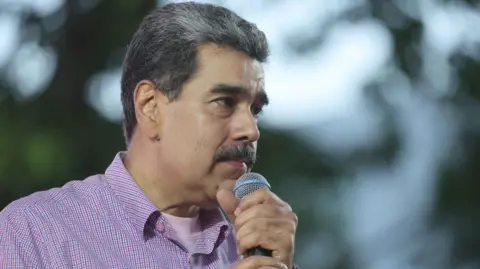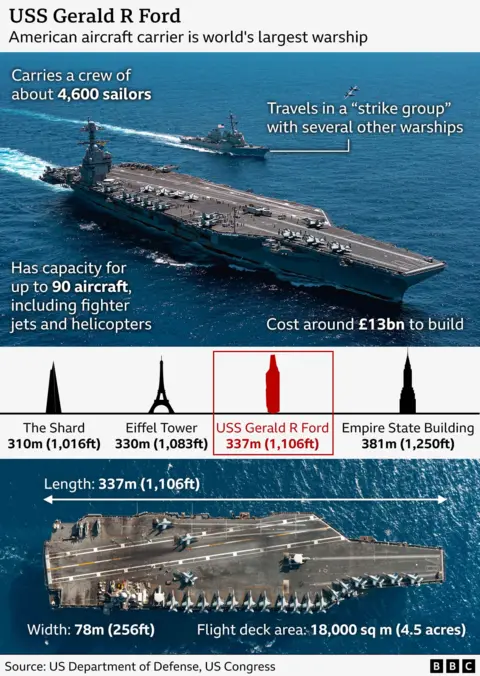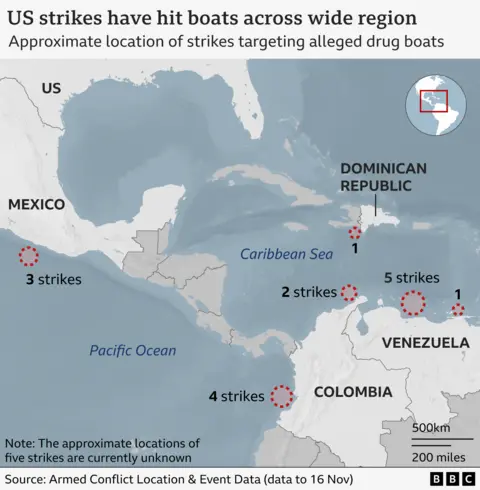Vanessa BuschschlüterLatin America editor, BBC News Online
 EPA
EPAVenezuelan leader Nicolás Maduro has said that he is willing to hold face-to-face talks with representatives of the Trump administration as US pressure on him grows.
Maduro made the comment hours after US President Donald Trump said he had not ruled out deploying ground forces to the South American country.
The Trump administration has accused Maduro – whose re-election last year was dismissed as rigged by many countries – of being the leader of a drugs cartel.
Maduro has denied the allegation and accuses the US of trying to incite a war to gain control of Venezuela’s oil reserves.
Since Trump was sworn in to a second term in office in January, the US government has been increasing its pressure on Maduro.
It has doubled the reward it offers for information leading to his capture to $50m (38m) and in August launched a counternarcotics operation targeting boats it accuses of transporting drugs from Venezuela to the US.
More than 80 people have been killed in the US strikes on suspected vessels since, most of them in the Caribbean as well as some in the Pacific.
According to US Secretary of War Pete Hegseth, the aim of “Operation Southern Spear” is to remove “narcoterrorists” from the Western Hemisphere.
But legal experts have questioned the legality of the strikes, pointing out that the US has provided no evidence that the boats were carrying drugs.
The size of the US military deployment – which includes the US Navy’s largest aircraft carrier, the USS Gerald Ford – has also led to speculation both in Venezuela that its real aim is to remove Maduro from power.

Trump has been repeatedly asked by journalists about his government’s plan and has given seemingly contradictory answers.
Asked by US broadcaster CBS on 3 November whether the US was going to war with Venezuela, Trump said, “I don’t think so.”
But on Sunday, when asked whether he would rule out US troops on the ground in Venezuela, he answered: “No, I don’t rule out that, I don’t rule out anything.”
However, when pressed on whether he would speak to his Venezuelan counterpart directly, he said: “I would probably talk to him, yeah.” “I talk to everybody,” Trump added.
Also on Sunday, the US state department said it “intended to designate Cartel de los Soles”, the Venezuelan drug trafficking gang it alleges is led by Maduro, as a Foreign Terrorist Organisation (FTO).
But rather than doing so immediately, the state department said the move would become effective on 24 November.
This delay – combined with Trump leaving the door open to direct talks – has been interpreted by some as a US ultimatum for Maduro: enter into negotiations or face even more draconian US measures.
Being labelled as an FTO means it becomes illegal for US citizens to knowingly provide material support or resources to the group in question.
According to the White House, it also then becomes the policy of the US to “ensure the total elimination of these organisations’ presence in the United States and their ability to threaten the territory, safety, and security of the United States”.
Some analysts think that just as the Trump administration has argued that it is legal to target alleged drug boats in the Caribbean because of the danger they say they pose to US citizens, it could use the FTO designation to bolster support for strikes against the Cartel de los Soles on Venezuelan soil.

In several of his recent public appearances, Maduro has addressed the US people directly, even speaking – and once even singing – in English.
On Monday, he said “dialogue, call, yes, peace, yes, war, no, never, never war” and stressed that he was ready to talk “face to face” with anyone in the US “who wants to talk to Venezuela”.
Past attempts by various parties at negotiating with representatives of the Maduro government have failed.
Talks between the Venezuelan opposition and the Maduro government mediated by Norway and held in Barbados broke down as did an earlier Vatican-backed effort at finding a way out of Venezuela’s political crisis.
While the US has been ratcheting up the pressure on Maduro, Venezuelan opposition leader and Nobel Peace Prize Winner María Corina Machado has been trying to encourage the Venezuelan military to switch sides and turn on Maduro.
Speaking and posting from an undisclosed location in Venezuela, where she has been hiding to escape arrest, Machado has long denounced the Maduro government as “a criminal structure” and called on Venezuelans to unite to depose it, appealing to the security forces directly to switch sides.
In it she states that “we stand at the edge of a new era – one where our natural rights will prevail” and argues that Maduro and his close allies need to be held accountable for “crimes against humanity”, citing the mistreatment of political prisoners and detainees under his rule.

